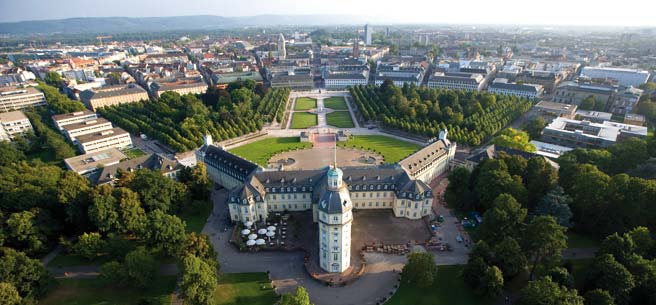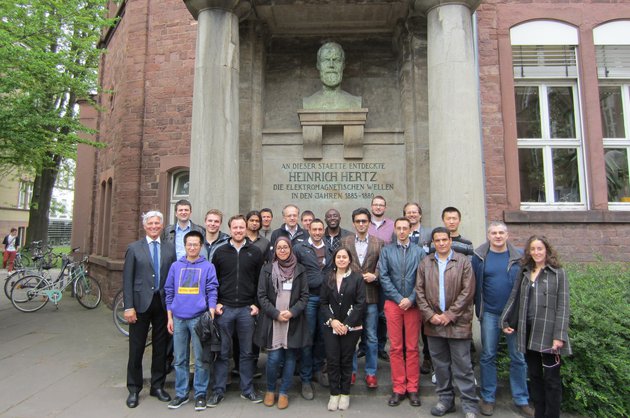Action TU1208
Civil Engineering Applications of Ground Penetrating Radar
COST Success Story
Training School on Future Radar Systems: Radar2020
Karlsruhe, Germany, May 5-9, 2014
The COST Action TU1208 co-organised, jointly with the European School of Antennas (ESoA) and the European Microwave Association (EuMA), a Training School on "Future Radar Systems: Radar2020." The School was held in the Karlsruhe Institute of Technology, in Karlsruhe, Germany, on May 5-9, 2014, and it covered the state of the art and new trends on radar technologies.
After an introduction to the radar basics, as the propagation of electromagnetic waves, radar equation, polarimetry, analysis of Radar Cross Section (RCS) of targets, including RCS measurement, the present radar types were presented, as the CW-, FMCW-, pulse-, MTI-, mono-pulse-, and UWB-radar. These lessons were complemented by the waveform and radar parameter topics. The core part of the course was the presentation of the concepts for future radars, which will be significantly different from the state of the art radars, with system functions like digital beamforming, MIMO radar, intelligent signal coding (f.e. OFDM) and antenna array imaging for high resolution-small size radars. Typical radar antenna concepts for beam-forming, arrays, and phased-arrays were presented. Another core part of the course were some special radar applications, like automotive radar, ultra wideband radar, of course the Ground Penetrating Radar, through-the-wall radar, and finally the Synthetic Aperture Radar for imaging.
Coordinator of the Training School was Prof. Werner Wiesbeck (Karlsruhe Institute of Technology, Germany, WG Member of COST Action TU1208).Trainers were Prof. Werner Wiesbeck, Prof. Thomas Zwick (Karlsruhe Institute of Technology), and Prof. Marwan Younis (Karlsruhe Institute of Technology). Also, the Action Chair attended part of the school and presented COST and COST Action TU1208.
- Trainees attending the School in Karlsruhe and Prof. Wiesbeck,
in front of the monument of Heinrich Hertz -
Class Scheduling
Monday, 5 May 2014 - Introduction and basic theory
Time | Teacher | Activity |
08:30 - 10:00 | Registration and welcome. | |
10:00 - 10:30 | Break | |
10:30 - 12:00 | W. Wiesbeck | Introduction, overview, radar history. |
12:00 - 13:30 | Lunch | |
13:30 - 15:00 | W. Wiesbeck | Propagation phenomena. Polarimetry. |
15:00 - 15:30 | Break | |
15:30 - 17:00 | W. Wiesbeck | Radar equation. Resolution. Accuracy. |
17:00 - 18:00 | W. Wiesbeck | Exercise. Discussion. |
Tuesday, 6 May 2014 - Basic theory and radar types
Time | Teacher | Activity |
08:30 - 10:00 | W. Wiesbeck | RCS definition. RCS of targets. |
10:00 - 10:30 | Break | |
10:30 - 12:00 | W. Wiesbeck | Radar types. Pulse radar. |
12:00 - 13:30 | Lunch | |
13:30 - 15:00 | T. Zwick | CW and FM-CW radars. Coding. |
15:00 - 15:30 | Break | |
15:30 - 17:00 | T. Zwick | Automotive radar. Virtual drive. |
17:00 - 18:00 | T. Zwick | Exercise. Discussion. |
Wednesday, 7 May 2014 - Future radar systems and Laboratory
Time | Teacher | Activity |
08:30 - 10:00 | W. Wiesbeck | Future radar systems. OFDM radar. |
10:00 - 10:30 | Break | |
10:30 - 12:00 | W. Wiesbeck | DSSS coding. Digital beamforming. |
12:00 - 13:30 | Lunch | |
13:30 - 15:00 | W. Wiesbeck | MIMO radar. Array imaging. |
15:00 - 15:30 | Break | |
15:30 - 17:30 | Daimler, IHE | Automotive radar demonstration. |
19:00 | Common dinner |
Thursday, 8 May 2014 - GPR and SAR
Time | Teacher | Activity |
8:30 - 10:00 | A. Yarovoy | UWB radar basics. |
10:00 - 10:30 | Break | |
10:30 - 12:00 | A. Yarovoy | GPR and through-the-wall radar. |
12:00 - 12:30 | L. Pajewski | COST Action TU1208 |
12:30 - 14:00 | Lunch | |
14:00 - 15:30 | M. Younis | SAR principles. SAR processing. |
15:30 - 16:00 | Break | |
16:00 - 17:30 | M. Younis | SAR performance parameters. SAR modes. |
17:30 - 18:00 | M. Younis | Exercise. Discussion. |
Friday, 9 May 2014 - SAR and final test
Time | Teacher | Activity |
8:30 - 10:00 | M. Younis | SAR Systems. SAR DBF. |
10:00 - 10:30 | Lunch | |
10:30 - 11:30 | All | Discussion. |
11:30 - 12:30 | Lunch | |
12:30 - 14:30 | All | Final exam |
Training School Grants
for PhD Students & ESR
The COST Action TU1208 offered 4 grants of 650,00 EUR to PhD Students and Early-Stage Researchers (ESRs) willing to attend the Training School on Future Radar Systems.
COST Training School grants represent a contribution to cover travel, meal and accommodation expenses. The deadline for submitting grant applications was May 2, 2014. Only Members of the COST Action TU1208 could apply.
The Trainees whose application has been granted are:
- Adabi Saba, Italy
- Ciccia Simone, Italy
- Prontera Santo, Italy
- Sun Shiliong, Netherlands
After the School, the granted Trainees coordinated between themselves to write a joint report, presenting in detail the radar concepts they learnt during the School.
For information concerning COST Action TU1208 and TU1208 GPR Association, please take contact with the Chair of the Action and President of the Association, Prof. Lara Pajewski. From 4 April 2013 to 3 October 2017, this website was supported by COST, European Cooperation in Science and Technology - COST is supported by the EU RTD Framework Programme Horizon2020. TU1208 Members are deeply grateful to COST for funding and supporting COST Action TU1208. As of 4 October 2017, this website is supported by TU1208 GPR Association, a non-profit association stemming from COST Action TU1208.




